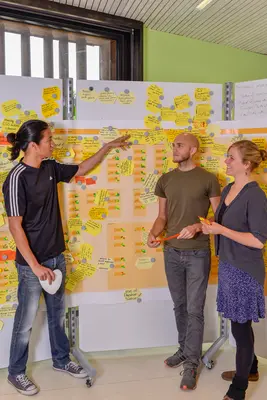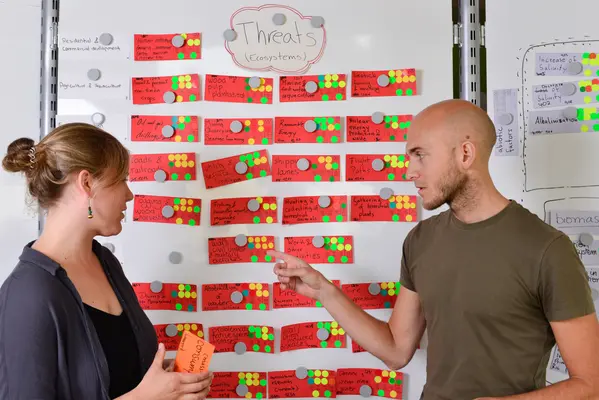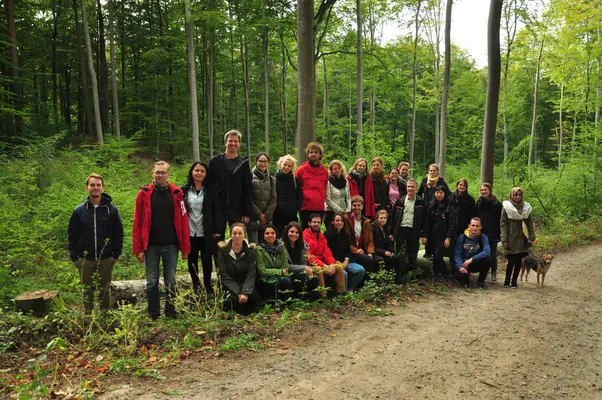Individual study contents
30 ECTS should be acquired per semester. This results in a total of 120 ECTS in four semesters. In the third semester you start your research project, accompanied by a research colloquium. In the fourth semester, you write your Master's thesis.
You acquire core competencies in the areas of:
- Dynamics of socio-ecological systems and their contribution to human well-being.
- Assessment of threats and risks to system functionality
- Developing skills needed to identify effective entry points for change
- Development of strategies for transformation management and its implementation
Modules per semester
Analysis of systems and the factors threatening them and human life.
You are enabled to understand and analyse the social and ecological basis of human wellbeing. You acquire skills to detect and document human-nature interactions in space and time, both on the local and the global level. You learn to conceptualize and critically assess different ways of measuring human wellbeing within planetary boundaries
You are enabled to understand the ecosystems and social systems relevant to human wellbeing. This includes understanding the functioning of both ecosystems and social systems, structures and processes that are crucial for their maintenance (functions), and the services derived from them for humans. Furthermore, you shall understand then inherently indeterminate dynamics of ecological or social systems. This enables you to critically discuss the weaknesses and strengths of the approach of social-ecological systems. You are able to derive requirements and limits for the management of complex systems.
Drivers of stress to systems functionality: You will be enabled to systemically understand and analyse human activities (“drivers of stress”) that directly lead to stresses on biological and social systems. To this end, at the completion of this module component, you will have learned approaches to terminological classifications, taking the drivers of stress as an example. You will have applied basic knowledge of risk management to the development of future scenarios and the identification of risks and blind spots. Finally, you will have practiced prioritisation of problems by assessing the criticality and strategic relevance of drivers of stress.
Root causes of system dysfunctionality: You are enabled to systemically understand and analyse those social framework characteristics which are the "root causes", indirectly leading to stresses on biological and social systems. To this end, at the completion of this module component, you will have further practiced approaches to terminological classifications, using the root causes of problems as an example. You will have practiced identifying their systemic relationships. You will have applied basic knowledge of risk management to the development of future scenarios and the identification of risks and blind spots. Finally, you will have practiced prioritisation of problems by assessing the criticality and strategic relevance of root causes.
You understand the carbon cycle with special reference to forests, soils and forest products. You are qualified to develop and critically reflect forest growth scenarios and have acquired basic knowledge of the purpose and the implementation of life cycle analysis (LCA), product carbon footprints (PCF) and corporate carbon footprints (CCF).
Sensors for automated measurements: You identify and describe the measuring principles behind sensor technologies used as data sources for environmental modelling. You know the principles of data quality assessment and further data processing procedures that guarantee a meaningful re-use of the measured data.
Process modelling methodology: You know about application areas of ecosystem models and are able to distinguish between different modelling concepts. You have a broad overview of different models and tools related to different focuses on environmental processes, e.g. carbon dynamics, water- and nutrient cycling, and biomass growth. You learn the principles of modelling practice in terms of parameter estimation, model set-up, and model validation. You conceptualize and design mathematical models to be used in environmental science, forestry and ecology.
You define input and output variables as well as protocols for modelling exercises.
To enable you to understand the theoretical fundamentals of global climate change and subsequent cross-scale impacts, and their regional manifestation in different environmental settings considering the interlinkages with human activities.
You can understand and apply the principles of academic writing and presenting. You can communicate effectively in an academic context.
You deepen your professional knowledge and skills in a specific area, that is of special interest for you. You can identify your personal interests in the field of global change management and expand your horizon to approaches in related study programmes.
Development of strategies for problem solving and implementation approaches.
You are enabled to adopt relevant principles of proactive strategic thinking for complex systems management and understand past and present societal transitions, their underlying patterns and key actors. Furthermore, you can evaluate different strategies of transformation on different levels and know how to apply tools to identify high leverage points in different kinds of complex systems.
You are able to initiate and implement transitional changes by acquiring skills for global leadership aimed at a sustainability transition.
To enable you, on the example of recent and ongoing projects, to understand and critically reflect different mitigation and adaptation solutions, strategies and management options, considering the relevance of stakeholders’ uncertainty and risk perceptions and different decision-making contexts.
You gain the ability to critically reflect approaches to development and development cooperation as well as trends of change and challenges. You are able to formulate constructive proposals for effective project design and implementation, paying particular attention to the drivers and impacts of global change.
You acquire a critical understanding of the challenges for sustainable development in transformation countries and are able to propose strategic elements for addressing challenges identified in a concrete case-study region.
To enable you to understand the theoretical and methodological fundamentals of systems leadership and to acquire leadership skills for large scale systems change.
You are able to apply competences in interdisciplinary scientific work and self-management in order to plan your own transformation project of moderate scope. The orientation of the project corresponds to the goals of the study programme and leads to an entrepreneurship that supports sustainability transformation.
You deepen your professional knowledge and skills in a specific area relevant to global change management. You identify your specific personal interests in the field of global change management and broaden your technical and scientific horizon.
Research project (at a partner institution in Germany or abroad) accompanied by internet based research colloquium.
You are enabled to plan and accomplish a research project of moderate size related to the study programme’s content.
You are able to discuss and present current research topics, accompanying the research projects of the third semester students.
You acquire further skills in interdisciplinary scientific work. You are able to evaluate research projects and to communicate results to expert and lay audience.
You obtain your own research results while solving and discussing a scientific problem. You present the research results of your master thesis and are able to defend its underlying assumptions, methodologies, and robustness of the key findings.



